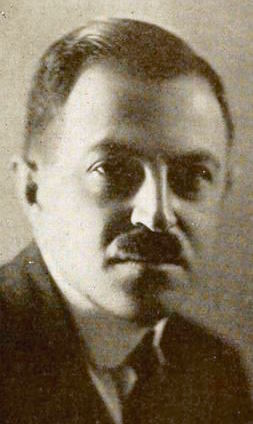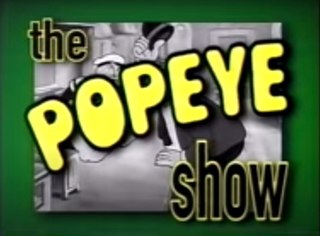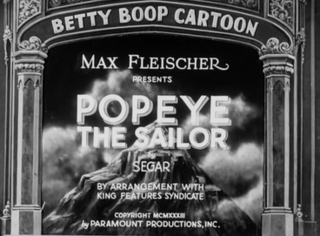
Olive Oyl is a cartoon character created by E. C. Segar in 1919 for his comic strip Thimble Theatre. The strip was later renamed Popeye after the sailor character that became the most popular member of the cast; however, Olive Oyl was a main character for a decade before Popeye's 1929 appearance.

Fleischer Studios was an American animation studio founded in 1929 by brothers Max and Dave Fleischer, who ran the pioneering company from its inception until its acquisition by Paramount Pictures, the parent company and the distributor of its films. In its prime, Fleischer Studios was a premier producer of animated cartoons for theaters, with Walt Disney Productions being its chief competitor in the 1930s.

Max Fleischer was a Polish-American animator and studio owner. Born in Kraków, Poland, Fleischer immigrated to the United States where he became a pioneer in the development of the animated cartoon and served as the head of Fleischer Studios, which he co-founded with his younger brother Dave. He brought such comic characters as Koko the Clown, Betty Boop, Popeye, and Superman to the movie screen, and was responsible for several technological innovations, including the rotoscope, the "follow the bouncing ball" technique pioneered in the Ko-Ko Song Car-Tunes films, and the "stereoptical process". Film director Richard Fleischer was his son.
Myron Waldman was an American animator, best known for his work at Fleischer Studios.

The Fleischer Superman cartoons are a series of seventeen animated superhero short films released in Technicolor by Paramount Pictures and based upon the comic book character Superman, making them his first animated appearance.

Famous Studios was the first animation division of the film studio Paramount Pictures from 1942 to 1967. Famous was established as a successor company to Fleischer Studios, after Paramount seized control of the aforementioned studio amid the departure of its founders, Max and Dave Fleischer, in 1942. The studio's productions included three series started by the Fleischers—Popeye the Sailor, Superman, and Screen Songs—as well as Little Audrey, Little Lulu, Casper the Friendly Ghost, Honey Halfwitch, Herman and Katnip, Baby Huey, and the Noveltoons and Modern Madcaps series.

Popeye the Sailor Meets Sindbad the Sailor is a 1936 two-reel animated cartoon short subject in the Popeye Color Specials series, produced in Technicolor and released to theatres on November 27, 1936, by Paramount Pictures. It was produced by Max Fleischer for Fleischer Studios and directed by Dave Fleischer, with the title song's music composed by Sammy Timberg and lyrics written by Bob Rothberg. The voice cast includes Jack Mercer as Popeye, Gus Wickie as Sindbad the Sailor, Mae Questel as Olive Oyl and Lou Fleischer as J. Wellington Wimpy.

Popeye the Sailor Meets Ali Baba's Forty Thieves is a two-reel animated cartoon short subject in the Popeye Color Specials series, produced in Technicolor and released to theatres on November 26, 1937 by Paramount Pictures. It was produced by Max Fleischer for Fleischer Studios, Inc. and directed by Dave Fleischer. Willard Bowsky was head animator, with musical supervision by Sammy Timberg. The voice of Popeye is performed by Jack Mercer, with additional voices by Mae Questel as Olive Oyl, Lou Fleischer as J. Wellington Wimpy and Gus Wickie as Abu Hassan.

Aladdin and His Wonderful Lamp is a two-reel animated cartoon short subject in the Popeye Color Specials series, produced in Technicolor and released to theaters on April 7, 1939, by Paramount Pictures. It was produced by Max Fleischer, and directed by Dave Fleischer for Fleischer Studios, Inc., with David Tendlar serving as head animator, and music being supervised by Sammy Timberg. The voice of Popeye is performed by Jack Mercer, with additional voices by Margie Hines as Olive Oyl and Carl Meyer as the evil Wazzir.

The Popeye Show is an American cartoon anthology series that premiered on October 29, 2001, on Cartoon Network. Each episode includes three Popeye theatrical shorts from Fleischer Studios and/or Famous Studios. The show is narrated by Bill Murray, who gives the audience short facts about the history of the cartoons as filler material between each short. Animation historian Jerry Beck served as a consultant and Barry Mills served as writer and producer. A total of 45 episodes were produced, consisting of a total of 135 shorts.
Samuel Timberg was an American musician and composer for the stage, film studios, and television.

Gulliver's Travels is a 1939 American animated musical fantasy film produced by Max Fleischer and directed by Dave Fleischer for Fleischer Studios. Released to cinemas in the United States on December 22, 1939, by Paramount Pictures, the story is a very loose adaptation of Jonathan Swift's 1726 novel of the same name, specifically only the first part of four, which tells the story of Lilliput and Blefuscu, and centers around an explorer who helps a small kingdom who declared war after an argument over a wedding song. The film was Fleischer Studios' first feature-length animated film, as well as the second animated feature film produced by an American studio after Walt Disney Productions' Snow White and the Seven Dwarfs, as Paramount had commissioned the feature in response to the success of that film. The sequences for the film were directed by Seymour Kneitel, Willard Bowsky, Tom Palmer, Grim Natwick, William Henning, Roland Crandall, Thomas Johnson, Robert Leffingwell, Frank Kelling, Winfield Hoskins, and Orestes Calpini.

Popeye the Sailor is a 1933 animated short produced by Fleischer Studios and distributed by Paramount Publix Corporation. While billed as a Betty Boop cartoon, it was produced as a vehicle for Popeye in his debut animated appearance.
Seymour Kneitel was an American animator, best known for his work with Fleischer Studios and its successor, Famous Studios.
Bob Rothberg was a Tin Pan Alley songwriter and lyricist. ASCAP 1936. Educ: New York public schools 1915; DeWitt Clinton High School, New York 1919; accountancy and law, New York Law School, Bachelor of Laws 1928. Educated in music and violin with private instructors. Rothberg is interred at United Hebrew Cemetery on Staten Island.
Samuel Lerner was a Romanian-born songwriter for American and British musical theatre and film.
This is a list of the 122 cartoons of the Popeye the Sailor film series produced by Famous Studios for Paramount Pictures from 1942 to 1957, with 14 in black-and-white and 108 in color. These cartoons were produced after Paramount took ownership of Fleischer Studios, which originated the Popeye series in 1933.

Popeye the Sailor is an American animated series of short films based on the Popeye comic strip character created by E. C. Segar. In 1933, Max and Dave Fleischer's Fleischer Studios, based in New York City, adapted Segar's characters into a series of theatrical cartoon shorts for Paramount Pictures. The plotlines in the animated cartoons tended to be simpler than those presented in the comic strips, and the characters slightly different. A villain, usually Bluto, makes a move on Popeye's "sweetie", Olive Oyl. The villain clobbers Popeye until he eats spinach, giving him superhuman strength. Thus empowered, Popeye makes short work of the villain.

Winston Singleton Sharples was an American composer known for his work with animated short subjects, especially those created by the animation department at Paramount Pictures. In his 35-year career, Sharples scored more than 700 cartoons for Paramount and Famous Studios, and composed music for two Frank Buck films, Wild Cargo (1934) and Fang and Claw (1935).

Popeye the Sailor is a fictional cartoon character created by Elzie Crisler Segar. The character first appeared on January 17, 1929, in the daily King Features comic strip Thimble Theatre. The strip was in its tenth year when Popeye made his debut, but the one-eyed sailor quickly became the lead character, and Thimble Theatre became one of King Features' most popular properties during the 1930s. Following Segar's death in 1938, Thimble Theatre was continued by several writers and artists, most notably Segar's assistant Bud Sagendorf. The strip continues to appear in first-run installments on Sundays, written and drawn by R. K. Milholland. The daily strips are reprints of old Sagendorf stories.













